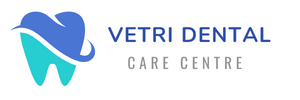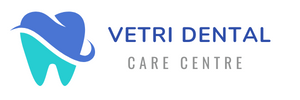A teeth cleaning procedure performed by a dentist involves a thorough examination to assess plaque and tartar buildup. Using specialized instruments, plaque and tartar are carefully removed through scaling. This is followed by polishing the teeth to eliminate surface stains and enhance the overall appearance. The cleaning process effectively maintains oral health and prevents dental issues. To explore further details about teeth cleaning and its benefits, continue exploring.
Key Takeaways
- The procedure starts with an initial examination to assess plaque and tartar levels on teeth.
- Scaling is performed to remove plaque and tartar using specialized dental instruments.
- Teeth polishing follows scaling to remove surface stains and improve the teeth’ appearance.
- The dentist may offer guidance on maintaining effective oral hygiene at home.
- Regular professional teeth cleanings are recommended every six months for optimal oral health.
What Does a Teeth Cleaning Procedure Involve?
A teeth cleaning procedure involves several systematic steps that are essential for maintaining oral health.
The process effectively removes plaque and tartar through the use of specialized tools, ensuring that the patient’s teeth and gums remain healthy.
The dentist or dental hygienist plays a critical role in this procedure, utilizing their expertise to perform each step with precision and care.
Steps in the Teeth Cleaning Process
Before delving into the specific steps of a teeth cleaning procedure, it is vital to understand that the process generally involves several meticulously executed stages designed to assure ideal oral health.
Initially, a dental hygienist examines to assess the presence of plaque and tartar on the teeth. The professional teeth cleaning commences with the removal of these deposits using specialized dental instruments. This step is essential in preventing gum disease and maintaining optimal oral hygiene.
Subsequently, teeth polishing is performed to eliminate surface stains, enhancing the teeth’s appearance. Finally, the dentist may advise on routine dental practices and preventive measures to sustain oral health.
This systematic approach guarantees a thorough dental cleaning and contributes considerably to long-term oral care.
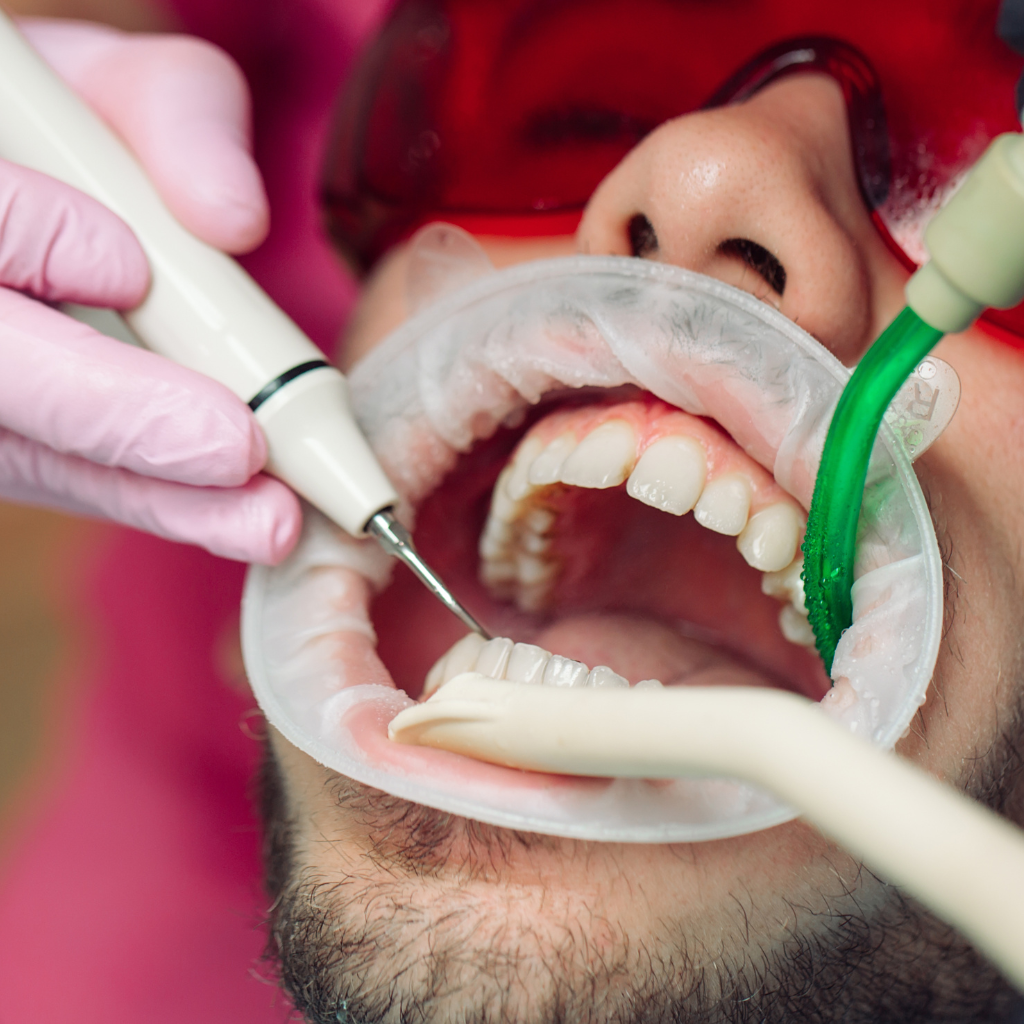
Role of the Dentist or Dental Hygienist
During a teeth cleaning procedure, the dentist or dental hygienist plays a vital role in ensuring ideal oral health through precise and systematic techniques.
Dentists and dental hygienists employ a thorough approach in every cleaning session. Initially, they examine your teeth to identify any potential issues, such as cavities or gum disease.
The dental procedure, typically performed by a dentist or a skilled hygienist, involves the removal of plaque and tartar buildup. This is often achieved using specialized instruments.
Teeth cleaning by a dentist is essential as it helps prevent oral health complications. A dentist may also offer personalized oral hygiene advice.
Regular dental visits to a dental practice are important for maintaining long-term oral health and preventing future dental issues.
Why is Professional Teeth Cleaning Important?
Professional teeth cleaning plays an essential role in maintaining ideal oral health by effectively removing plaque and tartar that regular brushing may miss.
This preventive measure greatly reduces the risk of gum disease and other dental issues, such as cavities and enamel erosion.
Additionally, routine professional cleanings promote healthier teeth and gums, contributing to overall dental well-being.
Benefits for Oral Health
Although many individuals maintain a regular brushing and flossing routine, professional teeth cleaning is essential for optimal oral health. This dental procedure effectively targets areas often missed by personal care, ensuring ideal oral hygiene and dental well-being.
Key benefits include:
- Plaque Removal: Professional cleaning removes plaque and tartar buildup that home care may not eliminate, which is vital for maintaining healthy teeth and gum health.
- Prevention of Gum Disease: Regular tooth cleaning can prevent the onset of gum disease, a common issue that leads to severe dental problems if untreated.
- Overall Oral Health: Through thorough cleaning and examination, dental professionals can detect potential issues early, ensuring a proactive approach to dental care.
These benefits underscore the importance of routine professional cleaning for sustaining ideal oral health.
Preventing Gum Disease and Other Dental Problems
Effective prevention of gum disease and other dental problems hinges greatly on regular professional teeth cleaning. This dental procedure is pivotal in maintaining ideal dental hygiene by removing plaque and tartar from the teeth, which regular brushing may not fully eliminate.
During a deep cleaning, the dentist meticulously cleans between the gums and teeth to prevent the onset of periodontal disease. Plaque accumulation can harden into tartar, which harbors bacteria detrimental to dental health. Consequently, routine dental care is imperative to thwart the progression of gum disease.
Professional cleaning not only guarantees that each tooth is spotless but also safeguards the structural integrity of the gums. An effective dental hygiene routine, complemented by professional intervention, is essential for thorough dental care.
The Impact on Teeth and Gum Health
While maintaining oral hygiene at home is essential, regular professional teeth cleaning plays a significant role in enhancing teeth and gum health.
The teeth cleaning treatment is a procedure that removes plaque and tartar deposits from the teeth and the gums. This is vital because:
- Prevention of Gum Disease: Regular teeth cleaning reduces the risk of gum disease by eliminating harmful deposits around your teeth.
- Decay Prevention: Professional cleaning every six months helps maintain the integrity of teeth by preventing decay.
- Oral Health Monitoring: During cleaning, dentists can identify potential issues early.
Cleaning is usually a safe, painless procedure that ensures that teeth are cleaned effectively and without discomfort.
Therefore, regular teeth cleaning is essential for maintaining oral health and preventing dental complications.
Is the Teeth Cleaning Procedure Painful?
The perception of pain during a teeth cleaning procedure varies among individuals, primarily influenced by the sensitivity of their teeth.
Managing sensitive teeth is essential to minimizing discomfort, and dentists may recommend specific strategies or products to alleviate this issue.
Additionally, understanding common side effects and preparing adequately can help patients experience a smoother and less painful dental cleaning session.
Managing Sensitive Teeth During the Process
Managing discomfort in sensitive teeth during a teeth cleaning treatment involves several strategies to guarantee dental cleanings are as pain-free as possible.
First, effective pain management requires communication with the dental clinic about any existing sensitivity before the cleaning appointment. This allows the best dentist to tailor the approach, making sure the procedure remains teeth cleaning safe.
Second, using desensitizing toothpaste before the appointment can help reduce sensitivity.
Third, requesting a topical anesthetic during the procedure can further minimize discomfort.
- Communicate Sensitivity: Inform the dental clinic of any sensitivity issues.
- Use Desensitizing Products: Prepare with special toothpaste.
- Request Anesthesia: Utilize topical anesthetics when necessary.
Guaranteeing clean teeth is essential, and cleaning is an important preventive measure.
Common Side Effects of Teeth Cleaning
Although teeth cleaning is a routine dental procedure, patients may experience some common side effects.
When teeth cleaning is performed, temporary sensitivity to hot or cold stimuli may occur due to the thorough cleaning required to remove plaque and tartar. This dental treatment might also lead to minor gum irritation or bleeding, which generally subsides quickly.
Despite these mild discomforts, dental cleaning is a safe procedure that is vital for oral health maintenance. Concerns that the process might damage your teeth are unfounded, as the cleaning and polishing of teeth are designed to enhance dental hygiene without adverse effects.
While some discomfort is possible, it is usually minimal and does not outweigh the benefits of maintaining clean, polished teeth.
How to Prepare for a Dental Cleaning Procedure
Before undergoing a dental cleaning procedure, patients are advised to take certain preparatory steps to guarantee a smooth and efficient experience.
Teeth cleanings are essential for maintaining oral health, so it’s vital to be ready for this routine procedure.
- Schedule with a dentist near you: Confirm availability and inquire about the cost of teeth cleaning to avoid surprises.
- Prioritize oral hygiene: Regularly floss your teeth and brush to minimize plaque and tartar from your teeth before your appointment.
- Be informed: Understand that teeth cleaning removes stains and tartar and is usually straightforward and not painful.
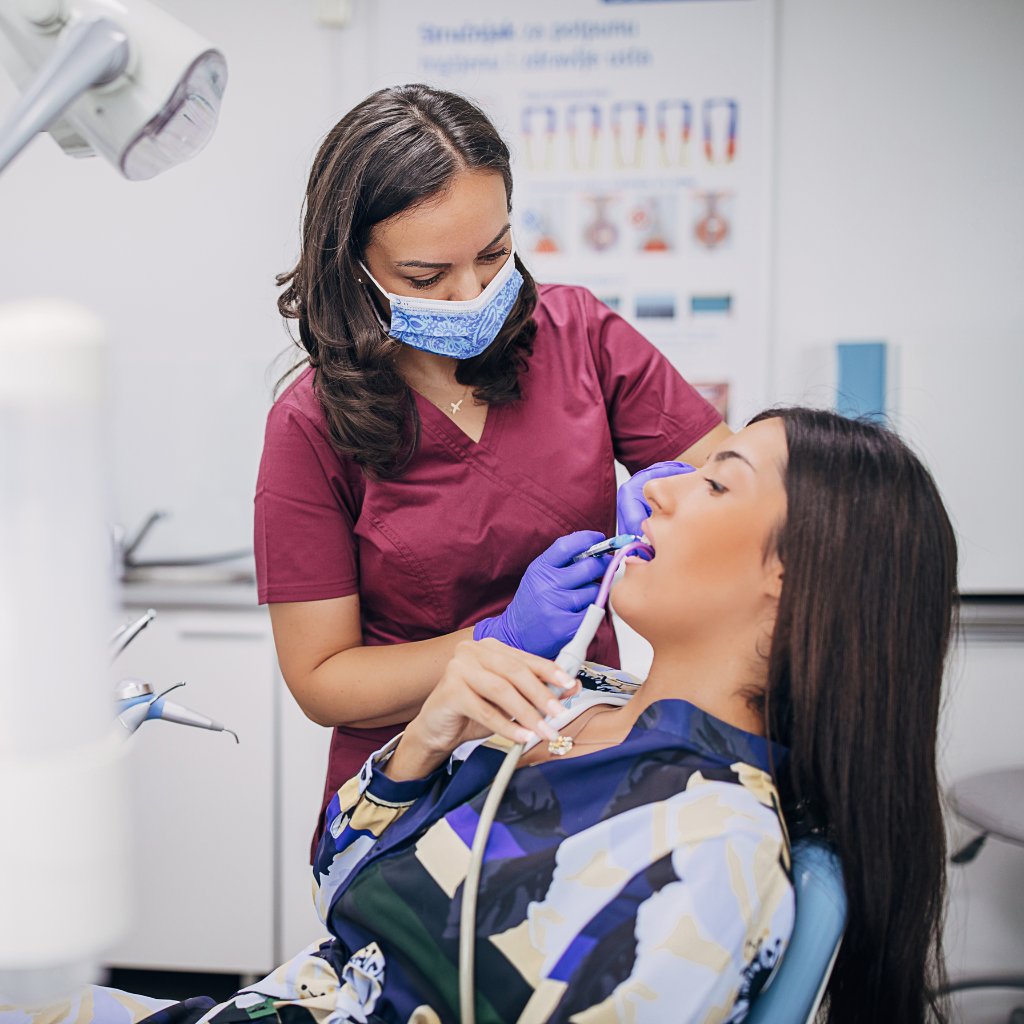
How Often Should You Have a Dental Cleaning?
Dental professionals generally recommend routine cleanings every six months to maintain ideal oral health.
However, several factors such as individual oral hygiene habits, medical history, and risk of periodontal disease can influence the frequency of these visits.
Personalized assessments by a dental care provider are essential to determine the most appropriate schedule for each patient.
Recommended Frequency for Routine Dental Visits
Regularly scheduled dental visits are vital for maintaining ideal oral health. The recommended frequency for routine dental visits typically involves biannual appointments.
During these visits, a professional teeth cleaning near the patient’s location is conducted to remove plaque and tartar from tooth surfaces that regular brushing cannot reach. This procedure is important for keeping teeth healthy, especially since cleaning is not a permanent solution to oral hygiene issues.
- Routine Check-ups: Biannual visits are advisable for most individuals to assess the health of teeth and gums.
- Dental Implants: Patients with dental implants may require more frequent monitoring to guarantee implant integrity.
- Next Cleaning: Determining the timing of the next cleaning is based on individual needs, as assessed by the dentist using tools and techniques used in the dental practice.
Factors Influencing Dental Care Schedule
Various factors, including individual oral health conditions, influence the frequency of dental cleanings.
Those with gum disease might require a deep cleaning near the affected areas more often than the standard biannual recommendation. Teeth whitening procedures do not replace cleanings, as they do not address underlying plaque or tartar.
Individuals with a history of cavities or painful oral conditions may need more frequent appointments. Additionally, lifestyle factors such as smoking or diet can affect how often teeth may require cleaning.
Regular consultations with a dental professional can help determine an ideal schedule tailored to an individual’s needs, ensuring that dental health is maintained effectively and efficiently.
What is the Cost of Teeth Cleaning?
The cost of teeth cleaning varies considerably depending on several factors, including the complexity of the cleaning procedure and the geographical location of the dental clinic.
Insurance coverage can greatly reduce the out-of-pocket expenses, but the extent of coverage is subject to the terms of individual insurance plans.
In addition, pricing may vary between private dental clinics and community dental services, necessitating a comparison to identify the most cost-effective option.
Understanding the Cleaning Session Costs
When considering the costs associated with a teeth cleaning session, several factors come into play that can influence the final price. These costs typically vary based on geographic location, the dental clinic’s pricing structure, and the patient’s oral health condition.
The following are key cost determinants:
- Location: Urban areas often have higher fees compared to rural locations due to increased operational costs.
- Clinic Type: Private practices may charge more than community clinics owing to differences in overhead expenses and service levels.
- Oral Health Status: Patients with periodontal disease require more intensive cleaning, thereby increasing the cost compared to routine maintenance cleanings.
Understanding these elements provides clarity on why teeth cleaning expenses differ, helping individuals make informed decisions regarding their dental care budget.
Insurance and Dental Clinic Options
Cost considerations for teeth cleaning extend beyond the immediate expenses of the procedure itself.
Insurance coverage greatly impacts overall costs, with many dental plans offering partial or full coverage for routine cleanings. Patients should verify the specifics of their policy, including copayments and annual limits.
Without insurance, prices can vary widely based on geographic location and dental clinic. Clinics may offer a sliding scale fee system based on income or membership plans that provide discounts for regular cleanings.
Additionally, some dental schools offer reduced rates as part of their training programs.
Selecting a suitable clinic involves evaluating the balance between cost, service quality, and insurance compatibility.
Ultimately, these factors collectively influence the financial accessibility of professional teeth cleaning services.
Are There Alternatives to Teeth Cleaning by a Dentist?
Individuals seeking alternatives to professional teeth cleaning may consider at-home dental hygiene practices, which include regular brushing, flossing, and the use of antimicrobial mouth rinses.
Additionally, over-the-counter teeth whitening products, such as whitening strips and gels, offer cosmetic improvements that can enhance the appearance of teeth.
Other options include natural remedies and diet modifications that may contribute to oral health maintenance, although their efficacy may vary.
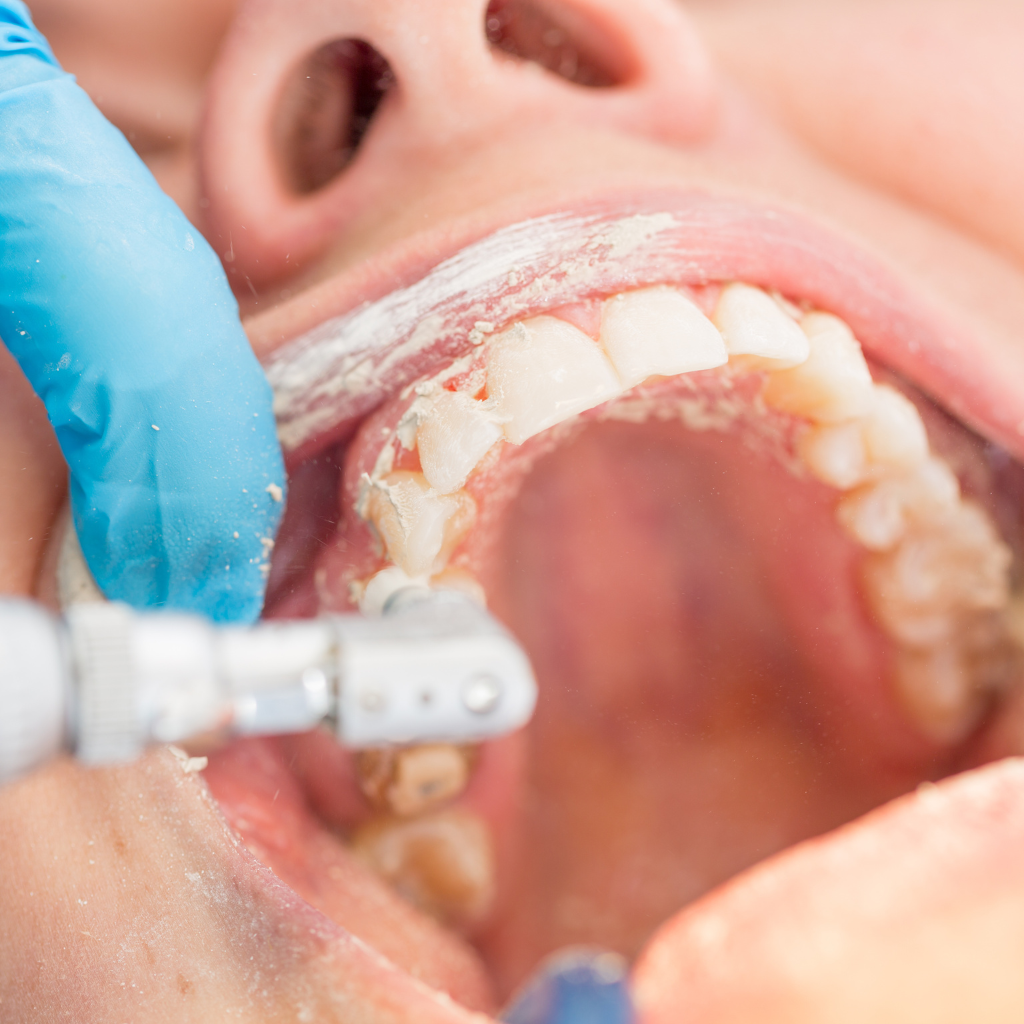
At-Home Dental Hygiene Practices
While professional teeth cleaning by a dentist is widely recommended for ideal oral health, various at-home dental hygiene practices can serve as supplementary measures or alternatives.
Effective daily oral care is essential for maintaining dental health between professional visits. Key at-home practices include:
- Brushing: Employ a fluoride toothpaste and a soft-bristled toothbrush to effectively remove plaque and prevent cavities. Brush twice daily for two minutes each time.
- Flossing: Utilize dental floss or interdental cleaners to remove food particles and plaque from areas between teeth that a toothbrush cannot reach, recommended at least once daily.
- Mouthwash: Use an antibacterial mouthwash to reduce oral bacteria, ensuring thorough oral hygiene. This can aid in combating plaque buildup and freshening breath.
Exploring Teeth Whitening and Other Options
Although professional teeth cleaning remains a cornerstone of oral care, various alternatives have emerged to enhance or substitute traditional dental visits.
Teeth whitening kits, available over-the-counter, use peroxide-based agents to lighten enamel discoloration. These kits offer convenience but lack the thorough plaque and tartar removal provided by professional cleaning.
Additionally, dental scaling devices, such as ultrasonic cleaners, are marketed for at-home use, claiming to remove tartar. However, improper use may cause enamel damage or gum irritation, emphasizing the need for professional oversight.
Oil pulling, an ancient practice using coconut or sesame oil, is believed to reduce bacteria and improve oral hygiene, yet lacks robust scientific validation.
These alternatives can complement dental visits but should not replace professional assessments and cleanings.
Conclusion
In summary, professional teeth cleaning is an important procedure that removes plaque and tartar, reducing the risk of cavities and gum disease. Despite common concerns, it is generally painless and necessary for maintaining oral health. The recommended frequency is every six months, although individual needs may vary. Costs can differ based on location and insurance coverage. While at-home oral hygiene is essential, it cannot substitute for the thoroughness of a dentist’s cleaning. Regular dental visits guarantee peak dental health.
